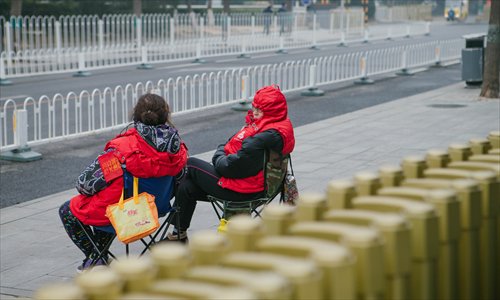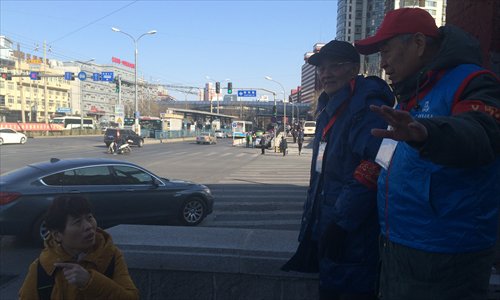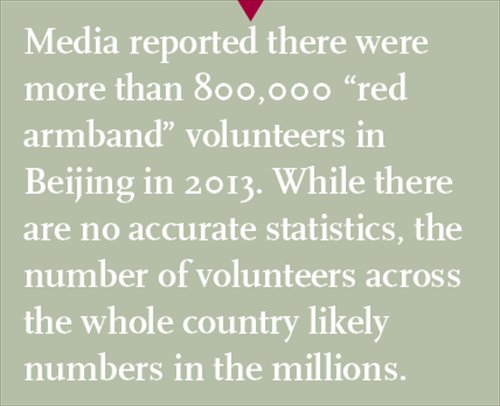Elderly volunteers once seen as ‘tipsters’ now secure communities
Elderly security volunteers once seen as ‘tipsters’ now do their best to secure communities
Every time a major event takes place, such as the ongoing two legislative sessions in Beijing, elderly people wearing red armbands appear on the city's busy streets and down its dark alleys. From an amateur intelligence organ of the authorities to safeguarding and serving residential communities, the role of the group has gone through great changes as China's society transforms.

Two women wearing red armbands chat as they keep an eye on a street in Beijing. Photo: Li Hao/GT
Despite the cold early March wind, 82-year-old Luo Chongchao kept a close watch on his patch of Beijing, on the lookout for anything unusual.
Occasionally some pedestrians passing by stopped and asked for directions. As he is getting hard of hearing, he would lean in to hear then and sometimes even walk with them for a few steps, making sure they understood where to go.
"When nothing happens [on the street], our main job is to give directions," said Luo, pointing to the red armband on his left arm that reads "Volunteer Security Guard."
While he performs his job of handing out directions diligently, such volunteers actually shoulder a serious duty. As his red band indicates, he is one of the thousands of volunteer security guards that are entrusted with helping to maintain security during the ongoing annual two legislative sessions.
Stationed in almost every corner of the capital, these retired people, mostly in their 60s and 70s, are helping to keep an eye on what happens in their communities.
"At such an age, we are not really able to work as security guards. The most we can do is report to the neighborhood committee whenever we notice something abnormal," said Luo.
Gao Zhihong, an 76-year-old man who patrols with Luo, says their "red bands" are deterrent for "bad people." "They would feel timid seeing the red bands, which will make them refrain from doing bad things in front of us," said Gao.

A passerby asks security volunteers for directions. Photo: Xu Ming/GT
Intelligence gathering
Luo and Gao are two of the around 100 volunteers patrolling their neighborhood in Xinjie community, Chaoyang district, this year. Mainly retired people and elderly Party members, these people hit the streets when there are major events such as last year's military parade or after the 2009 riots in the Xinjiang Uyghur Autonomous Region in which at least 200 people died.
When it was Luo's shift last Tuesday, he spent four hours, two in the morning and two in the afternoon, at his post.
"It is not enforced, but we feel obliged to show up when it is our due," Gao said, "We're getting old and it's one of the few things we can do to help."
As security guards, they are asked to report anything or anybody that they find suspicious. Anything involving security, such as thefts, scuffles, fires or even killings fall into this category. "We can only spot things that are very obvious - we are not specially trained," said Luo, who is a Party member and army veteran.
"When something happens, we can at least report the involved person's appearance, clothes and age," Gao introduced, "When we spot somebody abnormal, we do not confront them directly. We will have one person chat with them and hold them there, and another goes to report to the security staff after saying they need to go to the toilet."
"It needs a lot of flexibility. We usually have at least two people here in case there is an emergency," Gao added.
But mostly the job is unexciting. They spend most of their time giving directions. For Luo, it is a good thing that they "harvest" nothing after a day. "It means the environment we live in is safe."
Luo and Guo are part of the Chaoyang qunzhong (the Chaoyang masses), a nickname for volunteers and citizens of the district who are the eyes and ears of the authorities.
People joke that the Chaoyang qunzhong are one of the top intelligence agencies in the world, because they were able to catch many celebrities taking drugs in recent years. Often, the police will announce that the Chaoyang qunzhong reported the stars' illicit pastime.
Wang Ting, vice director of the Hujialou neighborhood office, claims that the volunteers play a significant role in maintaining order.
"People will feel safer seeing 'red armbands' on the street. The volunteers contribute greatly to safety in society," noted Wang, "First of all, they are a deterrent; and, as they are familiar with their environment, the clues they provide usually reach corners that the police fail to notice."

'Small feet agents'
Right after the dates of this year's two sessions was announced, the volunteers in different neighborhoods began asking about the security arrangement and showed their willingness to participate. "Some persisted taking on the duty in spite of their age," said Wang.
"They are not paid. They can only get things like rice, wheat powder or cooking oil at the end of year as encouragement," Wang told the Global Times, "but they are very active in contributing their part. There is a good tradition among the residents, generation by generation."
It is a tradition that started in the 1950s, Wang noted. Over the decades, the work of volunteers in different periods has varied a lot, from supervising their community to serving people and the city. And their image has also been transformed - at times they have been highly unpopular.
After the People's Republic was founded in 1949, the country began building self-administration organizations and in 1953, neighborhood committees were set up across the country to lead the public in carrying out security work. A large number of people were mobilized to help the government and public security organs to fight against "traitors to China," spies, thieves and counter-revolutionaries by reporting, supervising and even educating others. Besides State affairs, they also intervened in family disputes and all kinds of "movements" that involved sanitation and eliminating pests.
At that time, they did not wear red armbands and their image was relatively good. But when it came to 1960s and 1970s, volunteers wearing red armbands (following the uniform of red guards) were the front line of the government's social control apparatus during the 10 years of the Cultural Revolution (1966-76), when public security organs, procuratorial organ and courts were destroyed by the chaos of that time.
They became guards for "class struggle" and their eyes watched every move of the public, such as whether a family's children had obeyed the Party's call to go to the countryside to live and work with farmers. Then, spotting spies and secret agents was also part of their job. In a famous 1974 case, volunteer guards in Chaoyang discovered and helped arrest six Soviet spies.
And in the 1980s, the group grew infamous. Mainly composed of seniors and jobless women over 50, the group was mockingly called "small feet agents" because the elderly women were relics of a time when women bound their feet. They would intervene when neighbors quarreled, or when a boy wore bell-bottomed pants and even caught young dating couples. They would stand guard outside the home of families visited by relatives from foreign countries until the relatives left, and were often regarded as annoying busybodies.
From 1980s and 1990s, the group reported people who violated the family planning policy, and were often despised by their neighbors, even though they also reported suspicious cult followers.
Moving into the new century, they have gradually shed their hated role as "tipsters." Wang says that these days their role is less about ensuring conformity among their community and more about providing security to cope with the shortage of police.
The "small feet agents" are now playing an increasingly positive role. Their duties involve not only helping neighbors, giving directions, correcting uncivilized behavior (such as running red lights or spitting), but also organizing cultural activities in the community.
"There have been different focuses in different periods. To them, it is all about serving the country. But generally, the function of the volunteers has been expanding as the society develops. Now they are taking part in every aspect of society, from community building to environment protection, dealing with emergencies, and so on," noted Wang.
"Meanwhile, the group is getting increasingly specialized, diversified and organized, driven by social development," Wang added that in Hujialou, they have bought insurance for every volunteer, in case they get hurt on duty.
An irreplaceable role
According to a media report, in 2013, there were more than 800,000 "red armband" volunteers in Beijing. While there are no accurate statistics, the number of volunteers across the whole country likely numbers in the millions, all of whom report to China's smallest political unit - the neighborhood committee.
Though they work in obscurity, this group occasionally hits the headlines and arouses discussion.
For example, after Chaoyang qunzhong rose to fame in recent years for their high-profile reports of celebrities involved in prostitution and drug-taking, which was praised by the media and won much applause from the public.
Meanwhile, some wonder if this system is a proper way to manage a modern society ruled by law, particularly when it leads to invasions of privacy. There are netizens that have said online that they feel uncomfortable being observed by the elderly volunteers even if they have done nothing wrong.
But to Wang, young people who stress privacy in their life should understand the need to balance privacy and public security. "I'd put social security first," she said, particularly that, as Wang explained, as people move around the country more and more, it is increasingly difficult to manage a society with "increasing potential for safety hazards and risks."
Wang said that she used to feel perplexed too, thinking that professional security guards might do the job better. But she soon realized that the security guards are not familiar with the community and thus could not replace the volunteers' role.
"The elderly volunteers are so familiar that even if when they are chatting, they could spot when a stranger walks in the community," Wang said, "Besides, they serve as a mature channel sending messages between ordinary people and the government."
As Mei Xinyu, a commentator and researcher with the Chinese Academy of International Trade and Economic Cooperation, observes, the group of retired volunteers in China is of great elasticity and works effectively with civil servants at little cost.
"It is a cheap and effective mode of management that has widened the supervision over social administration and security," he said.
"The volunteer system is particularly suitable in Asian countries where it fits the social environment and could be implemented well," Mei added, "but I believe other countries may learn from it too in the future."
Newspaper headline: Grey guards